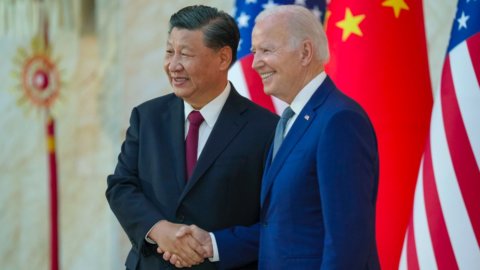After the tariff war with China, the shadows of a clash between the US and Europe are returning, over the web tax. And all in the midst of the Covid-19 crisis. The Financial Times has revealed the new escalation of a tension that had already exploded a few months ago, when even President Donald Trump had threatened tariffs on products imported from Europe, in particular French wines. The British financial newspaper became aware of a letter sent by US Secretary of State Steve Mnuchin to the ministers of the Economy of Italy, France, Spain and the United Kingdom, inviting them to loosen their grip on the ambitions of a tax against the Internet giants. The issue has been on the OECD's table for some time: at the end of January, 137 countries had actually agreed to reach an agreement on the taxation of the various Amazon, Facebook, Google, etc. by the end of 2020.
"Speeding up negotiations would distract us from addressing far more important issues, such as economic recovery," Mnuchin said. However, someone, like France, had already attempted a forward flight, anticipating a first attempt at taxation which, according to what was communicated by Minister Bruno Le Maire, yielded 2019 million euros to the French state in 350. “A not negligible result”, said Le Maire, who today in Les Echos defines Mnuchin's letter “a provocation. We've been inches away from a deal on taxing the digital giants, which they are perhaps the only ones in the world to profit from the coronavirus. The OECD agreement must be found as soon as possible”. Washington evidently does not share this opinion, which would like to resume negotiations more calmly, perhaps at the end of 2020, that is, after the presidential elections have ended. In the meantime, he urged not to take solitary initiatives: "We have said it several times - wrote Mnuchin -: against the countries that adopt these taxes, the US will react with proportionate measures".
The debate at the European level has been going on since 2017, but so far Brussels has never managed to get all the countries to agree. For obvious reasons: in Europe there are some countries, such as Ireland, Holland, Luxembourg and some Eastern countries, which adopt advantageous tax regimes for the big names on the web. Never like this time, however, the resources of the web tax would be vital, for everyone, to counter the economic crisis that is sweeping the entire planet. In fact, the Recovery Fund also counts on those revenues: 10 billion a year would come from the ETS reform (Emission trading system or pollution permits – for a fee – for large companies); from 5 to 14 billion a year through the carbon tax on imports with a high content of greenhouse gases; still 10 billion a year from a tax on companies that derive the greatest benefits from the existence of the single market; and finally 1,3 billion from the digital tax on the giants of the web





